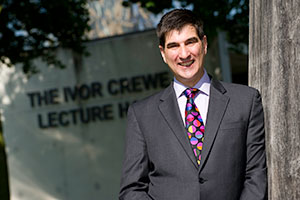
Professor Anthony Forster
Professor Anthony Forster, Vice-Chancellor of the University of Essex, has warned that new powers to be granted to the Home Secretary by the Counter-Terrorism and Security Bill are “broad and ill-defined.”
Speaking on BBC Radio 4’s Today programme, Professor Forster said the Bill, which is being debated in the House of Lords this week, “might be counter-productive in causing mistrust and alienation” and risk undermining academic freedom. He also outlined his argument in an opinion piece in Times Higher Education.
Professor Forster has led a group of vice-chancellors who wrote to The Times this week expressing their concerns about the Bill, which would give the Home Secretary power to give directions to vice-chancellors through court orders, and require universities to bar extremist speakers and report students.
More than 20 vice-chancellors were signatories to the letter, along with Essex’s Chancellor and Director of Liberty Shami Chakrabarti.
Collectively they warn that “to be truly effective in countering terrorism and radicalisation, universities must continue to be independent from government” and must remain “places where lawful ideas can be voiced and debated without fear of reprisal.”
Speaking directly to The Times, Professor Forster added that the measures “would have a chilling effect and inhibit legitimate academic debates.”
Professor Forster has also appeared on Radio 5 Live defending the principles of academic freedom and freedom of speech.
Professor Forster's interview on Today is available online (scroll through to 50 minutes) until 26 February.
Read the letter to The Times below:
In response to the Counter-Terrorism and Security Bill being debated in the House of Lords this week, we are profoundly concerned about the consequences for UK universities. Through their existing legal obligations, universities are already supporting the government’s Prevent Strategy to counter terrorism and radicalisation.
Universities are at their most effective in preventing radicalisation by ensuring that academics and students are free to question and test received wisdom within the law. The bill is not the best means of maximising the contribution universities can make, and may indeed be counterproductive, causing mistrust and alienation. The government does not appear to have considered how the bill will relate to universities’ existing duties and codes of practice concerning freedom of speech and academic freedom.
To be truly effective in countering terrorism and radicalisation, universities must continue to be independent from government. The new statutory duty should not apply to universities and they should be exempt, as proposed for the security services and judicial bodies.
This would safeguard the unique status of universities as places where lawful ideas can be voiced and debated without fear of reprisal.
Professor Anthony Forster, Vice-Chancellor of the University of Essex
Shami Chakrabarti, Chancellor of the University of Essex
Professor Craig Calhoun, Director and President of the London School of Economics and Political Science
Bill Rammell, Vice-Chancellor of the University of Bedfordshire
Professor Aldwyn Cooper, Vice-Chancellor of Regent’s University London
Professor John Drew, Chancellor of Regent’s University London
Professor Graham Galbraith, Vice-Chancellor of the University of Portsmouth
Professor Joy Carter, Vice-Chancellor of the University of Winchester
Professor Ray Hudson, Acting Vice-Chancellor of Durham University
Professor David Richardson, Vice-Chancellor of the University of East Anglia
Professor Dame Julia Goodfellow, Vice-Chancellor of the University of Kent
Professor Dame Julia King, Vice-Chancellor of Aston University
Professor Baron Piot, Director of the London School of Hygiene and Tropical Medicine
Sir Tim Lankester, Chairman of Council of the London School of Hygiene and Tropical Medicine
Professor Nick Foskett, Vice-Chancellor of Keele University
Professor Paul Webley, Director of SOAS
Professor Peter Strike, Vice-Chancellor of the University of Cumbria
Professor Julius Weinberg, Vice-Chancellor of Kingston University
Professor Gerald Pillay, Vice-Chancellor and Rector of Liverpool Hope University
Lord Charles Guthrie of Craigiebank, Chancellor of Liverpool Hope University
Professor Christina Slade, Vice-Chancellor of Bath Spa University
Professor Rama Thirunamachandran, Vice-Chancellor of Canterbury Christ Church University
Professor David Coslett, Interim Vice-Chancellor and Chief Executive of Plymouth University
Professor Cliff Allan, Vice-Chancellor of Birmingham City University